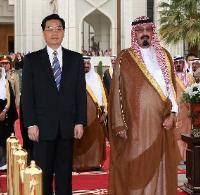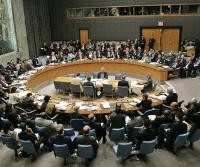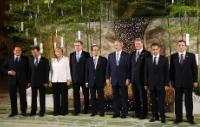In the aftermath of the Sichuan earthquake in May, I described China’s press management as controlled transparency, and mentioned that the cautious manner in which it allowed the world to see its domestic tragedy reflected a lot about how comfortable China was, or wasn’t, with its newfound status. The same obviously goes for the upcoming Olympic Games, and by every indication, China still has some ground to cover. With the opening of the Games just days away, the news has now leaked that Beijing has backtracked on its commitment to press freedom, restricting access to Internet websites ranging from the […]
China Archive
Free Newsletter

“If China is winning, the United States must be losing.” That is precisely the principle that many Americans see at work not only in the world, but also in the Middle East. China’s surging manufacturing capacity has contributed to the steep decline in manufacturing jobs in the United States. U.S. businessmen worry about the consequences of Chinese firms taking over U.S. firms such as Unocal and 3Com and scuttle the deals. U.S. bankers agonize over China’s massive current accounts surpluses and its huge dollar holdings. Many perceive China to be a military threat too, expanding its reach in the Pacific […]

On Friday, July 11, senior British and American leaders denounced China and Russia for vetoing a U.N. Security Council (UNSC) resolution that would have imposed sanctions against Zimbabwe’s President Robert Mugabe and his closest supporters for using violence and other manipulations during last month’s presidential elections. The U.S. ambassador to the United Nations, Zalmay Khalilzad, criticized Moscow and Beijing for having sided “with Mugabe against the people of Zimbabwe.” In his remarks to the council after the vote, Khalilzad observed that, “The u-turn in the Russian position is particularly surprising and disturbing.” Khalilzad then made the stinging comment that, “The […]
Now that the world is paying attention to Asia, what is Asia paying attention to? Central Asia. Specifically, Central Asian energy, according to this post over at 2point6billion.com. China and India are both making big pushes not only to secure oil and gas supplies, but also to establish military bases and defense agreements, and the scramble for a toehold in the region has broader strategic implications: “The global order is re-dividing into roughly two de facto blocs — one has the US at its core and the other has Russia-China at its core. Energy is the major dividing line between […]

The annual summit of world leaders is the focal point of G-8-related activity. The sessions offer national leaders an opportunity to meet with their foreign counterparts and, due to now standard practices of limiting attendance and holding the summits outside national capitals, engage in direct multilateral and bilateral discussions with limited interruptions. Russian President Boris Yeltsin began attending the G-8 summits in 1994, but he was only allowed to attend the special sessions devoted to political affairs. He remained excluded from the main talks devoted to economic questions, where Moscow’s global influence was much weaker. At the Denver summit of […]
